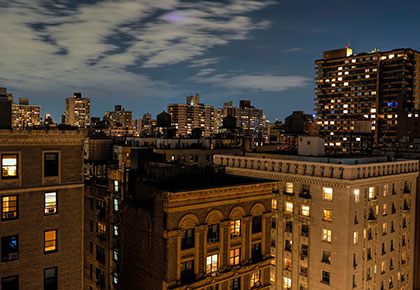-
Five tips to choose the right lifestyle community to meet your needs
There are many types, sizes and varieties of lifestyle communities to choose from, and as interest from homebuyers grows, developers and home builders are creating new ones to meet the demand. If you’re a prospective buyer and don’t know where to begin, we can help. We’ve compiled five important factors to consider to help you narrow down your choices and find the right lifestyle community to meet your needs. -
Residential pool inspection checklist
A health inspector is coming to assess your community pool. Are you prepared? If not, a pool inspection can be a major source of anxiety for your board members and residents. But don’t throw in the towel – there are steps you can take to make sure your inspection goes...well, swimmingly. -
Four Ways Condos/Co-ops and HOAs in Florida, New York and Chicago Can Save Money on Energy Bills with the Best Property Management Services
Realizing that energy conservation and managing HOA community environmental footprints is crucial, board members have a responsibility to homeowners to exercise financial prudence and proactively seek ways to manage rising costs. -
Four Ways to Increase Value by Decreasing Energy Use
Of all the expenses you encounter as a homeowner, community or condo association, energy ranks toward the top of the list. Many of us see this as a given. We need lights. We need heating and cooling. We need to warm our water and prepare our food. And while the necessity of energy use will never change, how much we pay for it, and how much we need, can. -
What is vendor management? The importance of vendor communication
Vendor management is a large part of serving on the board of a managed community. Every community has outside partners for services like landscaping, sanitation, cable and Internet provision, pool maintenance, valet services and more. Open and effective communication among the board, the management company and the vendors employed by the association is an important part of making the most of any community’s operating budget and improving the lifestyles of its residents. -
What to consider when hiring property management vendors
Your Board of Directors oversees the many day-to-day tasks required to operate and maintain your community…but they can’t do it alone. Your property management team will be expected to hire a wide array of vendors, including painters, plumbers, electricians, landscapers, repairmen for equipment maintenance or emergencies, exterminators, and more. -
The Hottest Trends in High Rise Amenities for 2017
It’s important to make sure that your high-rise building’s amenities are desirable and reflect the latest needs and wants of current residents, as well as potential buyers. Investing in amenities will have a twofold effect: it will enrich the lifestyles of your homeowners and residents, and it will make your high-rise more marketable and enhance property values. Updating your amenities doesn’t have to cost a fortune. Read on for some of the hottest trends in high-rise amenities and suggestions for staying current with any budget. -
Four ways to fund an HOA capital improvement project
Living in a residential community means around-the-clock routine maintenance to preserve the community and its assets. But there comes a time when one of your assets will reach the end of its useful life and require a replacement or significant repairs. -

Enhancing energy benchmarking in condos and co-ops
Condominiums (condos) and cooperative housing communities (co-ops) are increasingly recognizing the importance of sustainability and energy efficiency in today's world. One vital tool that plays a crucial role in this effort is energy benchmarking. -
5 steps to create lifestyle programs using community amenities
Now more than ever, communities are searching for ways to increase resident engagement and create a social atmosphere. One way managers capitalize on their available community amenities is through lifestyle programming. -
How to Protect Your Home from Wildfires
Wildfires continue to be a constant and deadly threat across North America, and the risk intensifies with soaring annual temperatures, strong winds and severe drought conditions. -
Summer energy conservation tips
Summer’s longer days mean more time to enjoy warm weather and sunshine, but they also mean higher energy bills. There is a bright side, however: by implementing an energy management program within your community, you can help keep costs down without sacrificing comfort. -
How Your Property Management Company Should Help Your Community after a Major Storm
As communities in Texas and Florida discovered in 2017, hurricanes can be devastating, even if your community takes all the proper precautions to reduce your association’s risk. Read how a property management company should assist your community after a storm passes. -
How Your Property Management Company is Your Best Friend During Hurricane Season
As a board member of a condominium or homeowners association near the coast, hurricanes are of special concern. But did you know that the best property management company can help you prepare for the season – and even minimize its impact on your community? That makes your property manager more than just a fair weather friend. -
Hurricane Plans and Policies: Reduce Your Association’s Risk
Hurricanes can bring tremendous physical destruction and financial ruin to a community association unless policies are put into place to prepare for the storms before they arrive, and to deal with the consequences afterwards. Every board whose association could possibly be impacted by a hurricane must have a hurricane preparedness policy to help maximize safety, minimize risk and ultimately, protect its operating budget too. And just as important as having a policy is communicating the policy to your residents. -
Incentives Aim to Green Up New York, Reduce Operating Costs for Building Owners
A recent study found that 75% of greenhouse gasses in New York City are generated by buildings, primarily multifamily residential buildings. As part of a city-wide effort to incentivize buildings to develop programs to curb emissions, FirstService Residential held its Third Annual Green Expo & Symposium on May 15 in New York. The event featured a panel of industry experts, including FirstService Residential President Dan Wurtzel, who described the benefits of participating in city programs, as well as the opportunities to save money, help the environment and enhance property values. -
Keeping HOA and Condo Common Areas Clean During the Coronavirus Pandemic
During these unprecedented times, residents are spending the majority of their time at home to prevent the spread of COVID-19 and protect themselves and their loved ones from infection. One of their primary contact points with the outside world is in your HOA or condo common areas, where they can be at risk of contact with lingering coronavirus or even spread existing virus to other areas of the property. Read on for a comprehensive list of places to clean and how to clean them. -
Lifestyle Expert Previews Amenity Trends for 2016 and Beyond
Location, location…amenities? As we told you in a previous article, the desirability of a community’s lifestyle amenities is becoming highly influential in driving the purchasing decision for many homebuyers. To rise to the challenge – and set themselves apart from the competition – many developers, builders and community associations are adding the next generation of amenities to their lifestyle communities, high-rises, condo buildings and other residential properties. And it’s working. By adding and/or updating their amenities to reflect evolving tastes, communities are effectively meeting the aspirations and demands – and enhancing the lifestyles – of potential and existing homeowners. -

Capital improvements vs repairs and maintenance: What’s the difference?
Maintaining your buildings’ assets is not a one-size-fits-all proposition. The common areas require a broad range of routine maintenance and repairs to keep them looking good and operating smoothly. -
Managing Waste for a Greener Community
With a growing focus on proper environmental stewardship, many associations are working toward implementing green initiatives. But getting there can be daunting. With so many programs and opportunities available for all of us to reduce, re-use and recycle, it’s hard to know where to begin. -
When a Natural Disaster Strikes, Is Your Association Covered?
Hurricanes. Floods. Tornadoes. Hail. Wildfires. Lightning strikes. Earthquakes. Blizzards. Mother Nature has quite the arsenal to throw at us! Unfortunately, every part of North America is subject to one or more of these events. Some, like hurricanes, come with enough advance warning to prepare for them, but most do not. That’s why it is critical to the financial health of your community association to have the proper insurance coverage in place. -
News You Can Use: Flash Flood Safety Tips to Keep Your Family Safe
In many parts of the country, flash flood watches and/or flash flood warnings are often issued during torrential downpours, especially in hurricane-prone and/or low-lying areas. -
Power Outages and Blackouts - How Your Association Can Minimize Risk
Losing power is never fun. But it’s bound to happen at some point, so preparation is the best defense. Obviously, different types of communities are affected by blackouts in different critical ways: high-rises lose their elevators and water; resort-style gated communities lose the ability to operate their gates. For residents, a blackout may be a short-term nuisance. For a community association, it can be a major headache in terms of risk management, safety and potential equipment damage that can provide an unwelcome shock to your budget. -
Why Preparation for This Hurricane Season is Important for Your Community
Is your community prepared to weather a storm? June 1st marks the beginning of the 2016 hurricane season running through November 30th. The National Weather Service reports that, of an average of 12 tropical storms that form over the Atlantic Ocean each year, six become hurricanes. In the Central Pacific, an average of three tropical storms form, with two escalating to full-blown hurricane status. Figures like these make hurricanes a very real threat for many communities and homeowners. In fact, 2016 promises to be anything but your average year. Let’s take a look at why you may want to approach this year in a way that’s as unique as the weather conditions themselves.